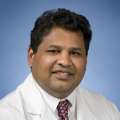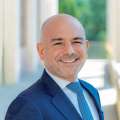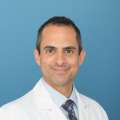When the UCLA Robert G. Kardashian Center for Esophageal Health opened in 2019, it did so with the grand goal of bringing together different medical specialties to develop new therapies to treat esophageal disorders.
The vision of its founding director, Jeffrey Conklin, MD, who died in 2022, continues today, said UCLA Health gastroenterologist Kevin Ghassemi, MD, interim director of the center.
“My goal has been to strengthen the collaborative effort that Dr. Conklin began in clinical care, as well as for education for health care providers and patients,” Dr. Ghassemi said.
A collaborative approach benefits patients
“Patients being able to see the necessary specialists in one location has not always been practical,” said Eric Esrailian, MD, MPH, chief of the Vatche and Tamar Manoukian Division of Digestive Diseases. “They may see a GI specialist in one part of town and then see a dietitian they found online in another part of town. But at UCLA Health, all of the practitioners work in one system. They meet regularly. There’s a clear leadership and support structure in place.”
“All of us working closely together increases the quality of care we deliver to patients,” said Jane Yanagawa, MD, interim chief of thoracic surgery at UCLA Health.
“We are able to build on each other’s expertise by maximizing coordination among all different phases of care, from the GI doctor who does the initial biopsy to the radiation oncologist and medical oncologist who provide the initial care to the surgeon who performs the operation.”
Early detection is key
Raman Muthusamy, MD, has been a key partner in the collaboration within the Kardashian Center. As medical director of endoscopy at UCLA Health, Dr. Muthusamy has developed new ways to detect and treat diseases such as Barrett’s esophagus.
Barrett’s esophagus is a condition in which the lining of the muscular tube through which food passes from the throat to the stomach becomes damaged by acid reflux. It can be a precursor to esophageal cancer.
“We now have a variety of improved ways to better detect if a patient has Barrett’s esophagus and to predict which patients will develop precancerous or neoplastic changes,” Dr. Muthusamy said.
Early detection also means greater ability to eliminate cancers and precancerous lesions of the esophagus endoscopically, before they advance, so patients can avoid surgery.
Honoring two legacies
As the Kardashian Center continues to build upon the work of Dr. Conklin, it also honors the life of Robert Kardashian, the noted Los Angeles attorney, who died in 2003 from esophageal cancer.
“Dr. Conklin was an educator and a master clinician,” Dr. Esrailian said. “We hope to further honor his legacy by establishing an esophageal fellowship in his name. And Mr. Kardashian has had such a major impact. His family has helped promote the center around the world and disseminate the work being done there by faculty and staff.”
Entrepreneur, philanthropist, reality TV personality, and daughter of Robert Kardashian, Kim Kardashian shared her thoughts on her father's legacy.
"This year marks the 20th anniversary of our father’s passing and we’re incredibly honored to remember his legacy with the Robert G. Kardashian Center at UCLA. Over the past four years, the center has provided patients with exceptional care and treatment, and it continues to advance research and education around esophageal health," she said. "We want to thank all the caregivers at the Center for their hard work.”







